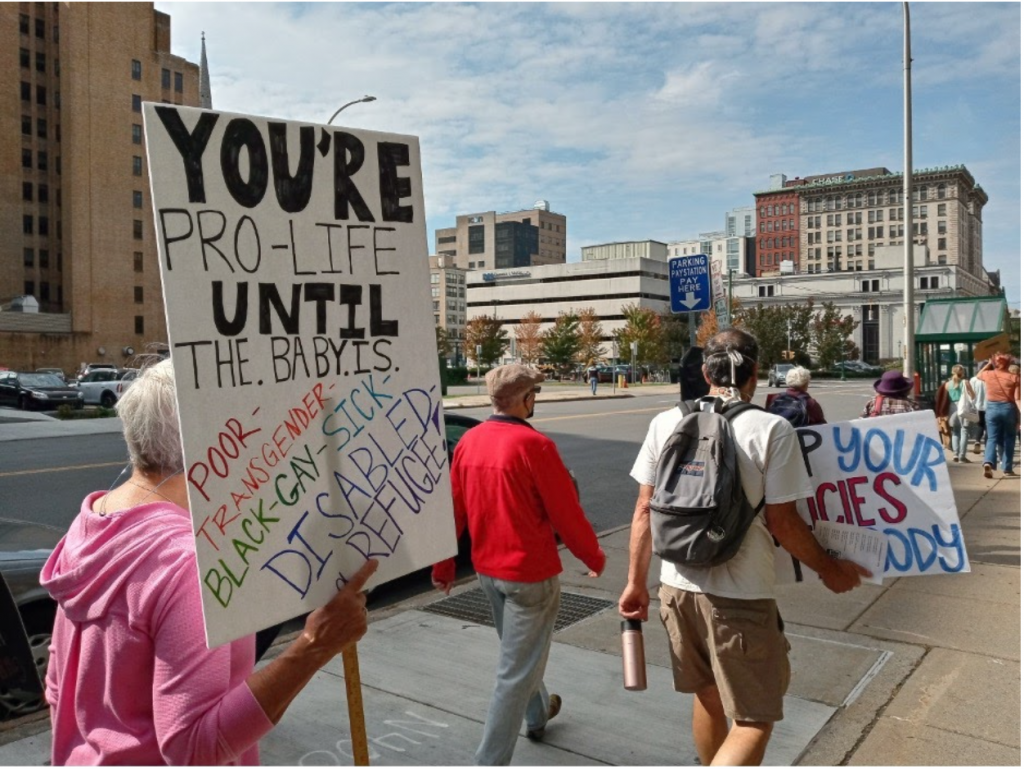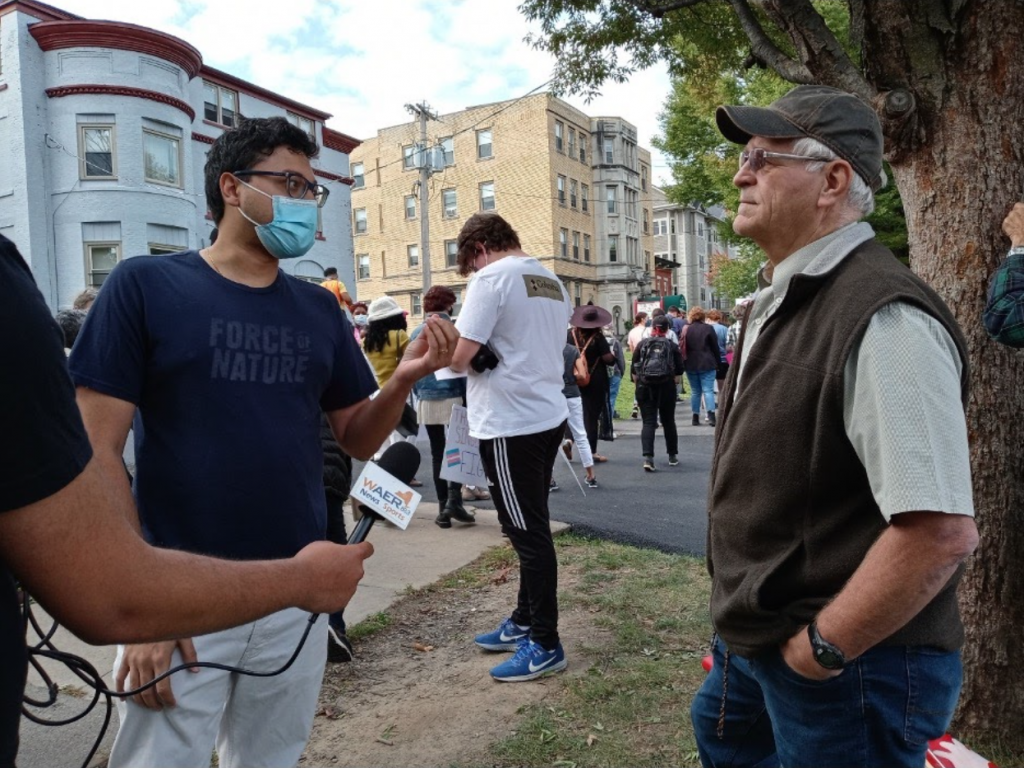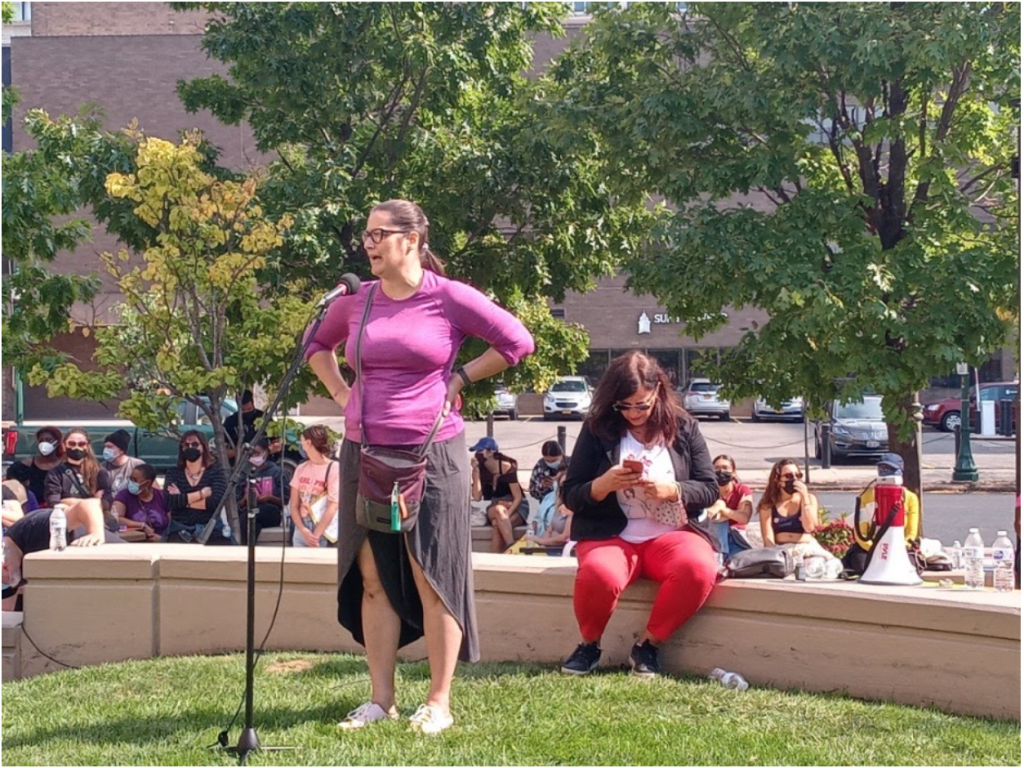Hundreds rally in Syracuse in support of abortion rights
Syracuse residents rally for abortion rights

Hundreds of pro-choice residents flooded downtown Syracuse on Saturday, joining a national movement to call out the recent Texas anti-abortion legislation.
On Saturday, community activists and lawmakers addressed crowds at both the health center and the James M. Hanley Federal Building a month after the Supreme Court allowed a controversial anti-abortion law to stand in Texas. New York assembly members Pamela Hunter and William Magnarelli were in attendance.
“Right now, in Texas, it’s reprehensible what this legislature has voted on to roll back provisions for our women’s reproductive rights,” said Hunter, who represents Dewitt, Salina, and the Southside of Syracuse.
The mile-and-a-half march, in conjunction with marches across the country, precedes a hearing on Dobbs v. Jackson Women’s Health Organization, a highly-anticipated Supreme Court case that could represent the end of a national right to have an abortion. A representative from Gov. Kathy Hochul’s office promised that the governor would work to educate New Yorkers and healthcare providers on abortion care within the state.
“Anyone in need of abortion care can look to the Statue of Liberty in New York Harbor, welcoming them to hope and safety and to other places like Syracuse across the state,” said Jessica DeCerce, director of Interagency Affairs in the governor’s office.
A handful of pro-life demonstrators were on the fringes of the rally, but didn’t join the larger protest that departed for the federal building. As people went their separate ways, Dr. Harsha Gowtham, a doctor from Upstate Medical University attending the march, engaged in dialogue with Joe Lemon, a technician protesting the march with pro-life organization 40 Days for Life.

“Have you seen an abortion, sir?” Gowtham asked Lemon.
“No, I haven’t,” Lemon responded. “Online I have. TV I have.”
“Have you seen pictures?” Gowtham asked. “Or have you seen an actual abortion being conducted on video?”
“I saw a video,” Lemon responded.
“OK, how big was the fetus?” Dr. Gowtham continued. “Was it like that big baby that he was talking about?”
“No, it was a baby,” Lemon responded.
No, I agree,” Dr. Gowtham said. “The question is how do you save that life?” This conversation went on for four more minutes before Gowtham and Lemon parted ways.
While speeches at the Women’s Health Center were dominated by politicians, at the federal building, community leaders took center stage with speeches ranging from emotional to educational. These included people such as the Rev. Jennifer VonRue of the May Memorial Unitarian Universalist Society, and Jasmine Collins, organizer with the Syracuse chapters of Democratic Socialists of America and Black Lives Matter.
“I want to talk to people who are uncomfortable with identifying as pro-choice, because I was once that,” said Collins. “Everybody should have the right to determine what happens with their own bodies. It’s terrifying to not have that right.”
“Here’s what’s going to happen if we ban abortion, we know because we tried this experiment,” she continued. “The privileged folks, the rich folks, the people with connections are just gonna hop across some borders or find some doctors who can give them the service and they’ll be all right.”
As some speakers highlighted, the Hyde Amendment plays a role by preventing federal funds from paying for abortion services. Dr. Renee Mestad, an OB/GYN, addressed how this affects people who rely on the federal government for healthcare.

“The Hyde Amendment also includes NIH [National Institutes of Health] dollars.” Dr. Mestad said, “So that means we cannot get federal funding for abortion training or for abortion research. All of it comes from private sources. And, you know the Hyde Amendment also includes our military patients.”
U.S. Sen. Joe Manchin of West Virginia told National Review that he would not vote for a budget reconciliation package that did not include the Hyde Amendment.
“I would say to the voters in West Virginia that whoever is running against him, they need to rally and support and uplift and support and give as many donations as possible,” Hunter said after her speech, “Because we need to be moving forward.”
Many of the speakers spoke to the importance of intersectionality within the abortion-rights movement. SeQuoia Kemp, a doula who provides physical and emotional support during pregnancy, asked the crowd how many people knew Loretta Ross, a professor at Smith College who coined the term “reproductive justice” in the 1990s. Not many people raised their hands.
“It’s absurd that we don’t see ourselves in this movement when it’s Black and Brown women who started that reproductive justice movement in 1994,” Kemp said.





